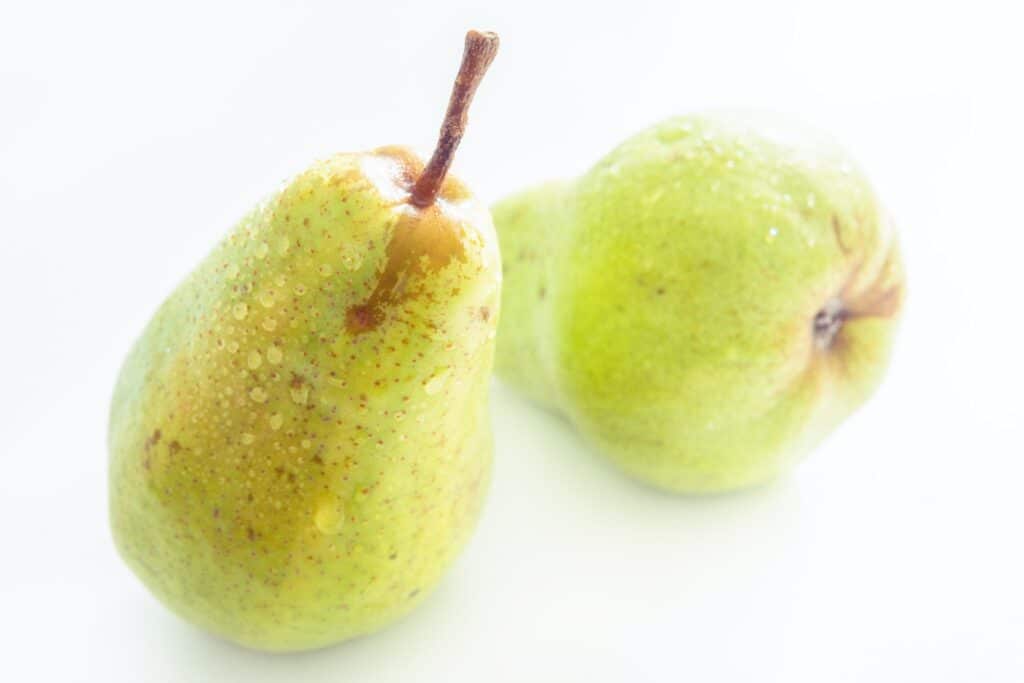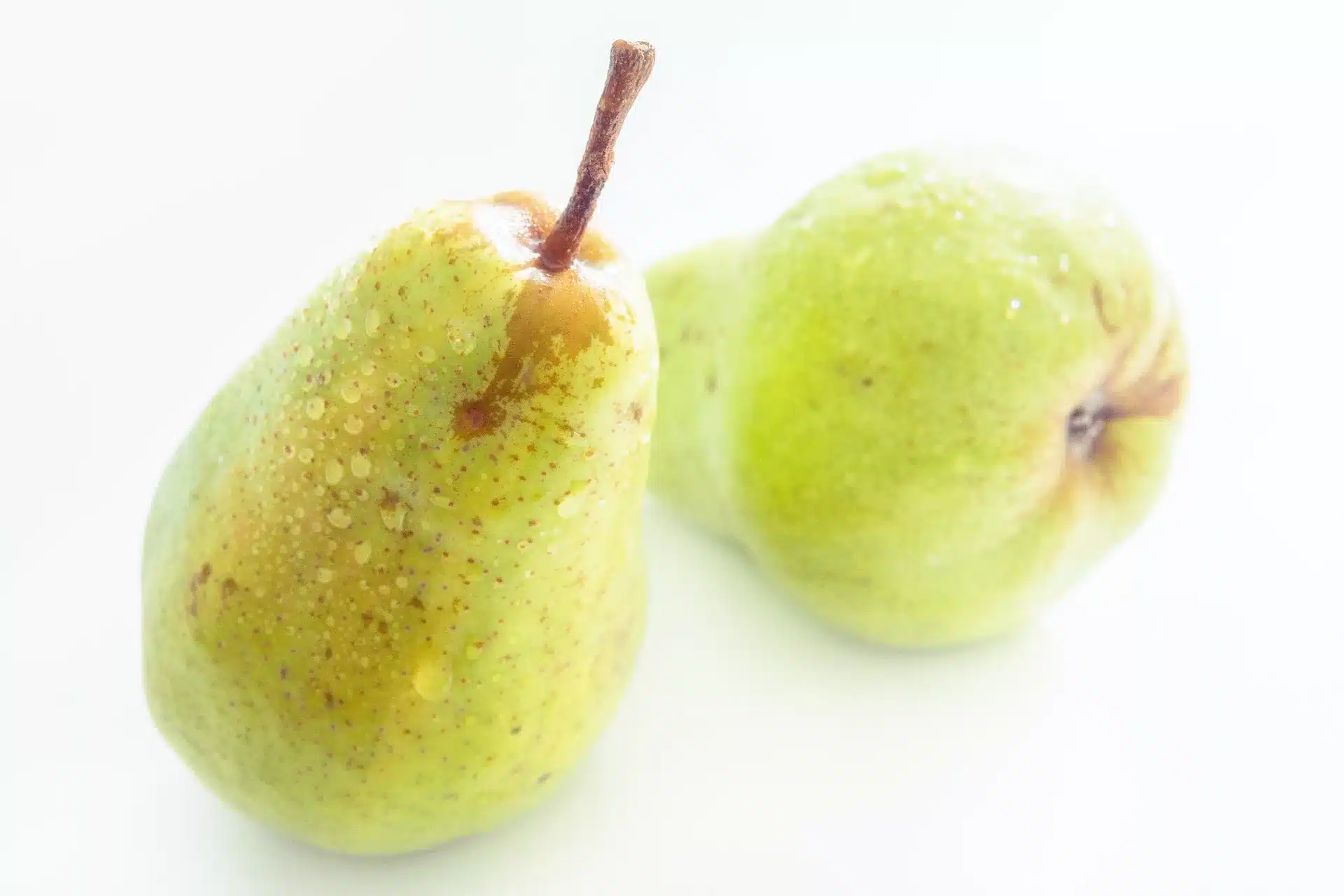Pears contain a lot of natural sugar, but can dogs eat pears? Pears are a great option if you’re looking for a simple way to introduce your dog to fruit. Pears contain a lot of natural sugar. Dogs can indeed eat them, too!
Fruit, like pears, is something we humans adore. The desire to share our passions with our dogs is natural. Our dogs occasionally get into trouble due to this propensity. Can dogs eat pears? The majority of pet owners are aware that not all fruits and vegetables are suitable for canines. Fortunately for our canine friends, the answer is true.
Table of Contents
Related Posts
- Can Dogs Eat Pork? When Is Pork Bad For Dogs? what should I do?
- Can dogs eat tilapia? Is tilapia safe for dogs?
- Can dogs eat salami? Is salami safe for dogs?

Can Dogs have Pears?
It’s completely safe to regularly give your dog pears. Pear chunks are also great for dogs to chew on after meals! You can feed them whole, dipped in some yogurt or peanut butter, or even just plain! But keep in mind that not all dog breeds should consume high-fiber diets because it may upset their digestive systems, especially if you give it to them along with foods high in fat. Instead of being fed daily, it functions best as an occasional treat.
If you decide to feed your dog regularly, be sure to watch the amount you give them and keep an eye on them while they consume something that isn’t good for their digestive system. To make sure your dog gets enough vitamins, you can use this ingredient in small amounts or at room temperature only when adding it to smoothies. But unless you’re trying to make homemade pet treats, avoid mixing them with insoluble fiber.
Does My Dog Need Pears?
It is advantageous to introduce your dog to foods intended for their health if you are raising dogs that are fed naturally. Pears, which can offer a variety of essential nutrients and are low in fat, are therefore worthwhile to serve as a treat or snack once or twice a week. However, it is extremely unwise if you notice that the fruit has begun to rot because this will seriously harm the animal’s digestive system, which includes its intestines. Additionally, these can have a lot of harmful side effects that could be fatal for your pets, so always use caution when feeding them for the sake of their health and well-being.
Pears’ Health Benefits For Dogs
Pears have been shown to have several positive effects on dogs, including improving general health and making them more tolerant of upset stomachs and gastric irritation. Additionally, it does have one-third of the recommended daily intake of iron, which is hardly enough. However, this ought to be more than enough to maintain your dog’s good health. Make sure that the breading accurately represents the size when using breaded pears as healthy snacks. Therefore, the answer to the question ” Can dogs eat pears? ” is yes.
Can My Dog Get Sick From Eating Pears?
Naturally, keeping your dog healthy and fed is wonderful, but there are many common foods that the dog can enjoy, like fruits, which make it essential to restrict their intake. When things go bad or the seasons change, dogs frequently find them to be great treats, but if you want to give them more variety in their diet, you should limit this. and refrain from overindulging in anything that could result in them developing too many illnesses and diseases, whether those conditions are desirable or not.

Can dogs eat Asian pears
Dogs can consume Asian pears, yes. Dog owners frequently mention how much their dogs enjoy the taste of these fruits. Although they can be used as treats, you should serve them in moderation. Asian pears are generally safe for dogs to eat. They provide a variety of nutrients, including fiber and vitamins A and C. However, there are a few considerations when giving Asian pears to your dog. Before feeding the fruit to your dog, be sure to remove the seeds. Seeds contain cyanide, which is toxic to dogs and can be a choking hazard.
Second, it’s crucial to gradually introduce Asian pears into your dog’s diet because they are high-fiber food. Give your dog a few pieces of the fruit to start, and keep an eye out for any signs of digestive distress. If everything goes according to plan, you can gradually increase your dog’s intake of Asian pears. Remember that Asian pears contain sugar, just like all other fruits. Consult your veterinarian before giving this treat to your dog if they have diabetes or are obese.
Can My Dog Eat A Lot Of Pears?
Can dogs eat pears safely? In reality, pears pose little risk to your dog. However, you should be limited in how you choose to feed them. Many dogs eat it as an all-day snack, or they may even sprinkle it on top of their kibble after being cut up into small pieces. However, if consumed in excess, these substances can be fatal, especially in dogs who lack the necessary defenses against this kind of food. Therefore, I advise purchasing fruit-flavored biscuits, dried pear slices, or fruit rolls.
When it comes to a dog’s health, low-fat, low-salt, and balanced meals are crucial. If you want the best outcome for any of your pet’s many needs, plan their diet carefully. Knowing what kinds of foods they can eat is always a good idea. But also how much, as this will help control their weight otherwise since dogs are dogs, after all, everything tends to get out of control quite quickly! The ingredients in dog treats should be safe for a dog’s digestive system and nutritionally suitable for consumption, according to the rules for dog treat manufacturing.
Can dogs eat canned pears?
Yes, it is well known that some dogs like the texture of canned food. However, it is not advised for dogs to eat these kinds of foods due to the high sugar content in canned fruits.
Can pears be replaced with any natural alternatives?
It is frequently advised that dogs consume parsley or catnip in place of fresh ingredients like onions and garlic to help lessen their negative effects. This herb is frequently used for its calming effects and can be incorporated into many recipes to add flavor and aroma while also providing positive effects on general health. Since parsley is a complete plant and can contain a variety of ingredients that dogs may not be able to tolerate, it might not be suitable for all dog diets.
Additionally, there are comparable herbal substitutes that are completely natural and do much less harm than parsley, such as peppermint or sage. Additionally, if your dog does enjoy canned treats, using low-sodium alternatives should help her avoid health problems like high blood pressure or heart disease.
You can also feed them dried pears, but you must make sure that they are very fresh, and it is crucial not to overfeed them. I advise avoiding anything with added salt or sugar as much as possible because doing so frequently results in undesirable side effects like gas formation, bloating, diarrhea, etc.
Can Puppies Eat Pears?
Some dogs like the taste of pears while others don’t when it comes to canines. Due to their rapid growth and consequently weakened immune systems, puppies under the age of five can be very problematic. Therefore, giving your pet canned food might not be the best idea (though still serves as food.)
Even dried pears would turn sour when heated for these dog breeds, indicating that they would later become dangerous to them. Instead, I’d advise giving them simple snacks like celery sticks or fresh or cooked pears, which naturally cause less cancer and are much healthier when included in well-balanced diets overall.
How to Give Dogs Pears
For dogs who aren’t particularly interested in trying a wide variety of foods, you can either feed them exclusively as treats throughout the day and then at their regular meal, or you can incorporate them into their daily diet.
Pears are quite different from the foods that most dogs are used to eating, so you must always keep that in mind when feeding them. Ultimately, just move slowly until your puppy gets used to the diet and pair it with having enough varied foods on hand.
When Do Fruits Pose A Risk To A Dog?
When fruit contains specific pesticides or organic toxins, it is toxic to dogs. Citric acid, a toxin found in citrus fruits, grapes, raisins, and other fruits, can occasionally be harmful to your dog. Typically, it results in nausea and intense thirst. When given all at once rather than in moderation through treats, some fruits with high sugar content for humans can choke or upset a dog’s stomach.
Fruits like avocados, figs, and pineapple may also be problematic. Bananas, blueberries, and strawberries are a few fruits your dog can eat without getting sick. Avoid worrying about calories when giving your dog fruits. The fruit is loaded with vitamins and minerals that are beneficial to the health of the dog.
Potential Risks of Pears for Dogs
Although they are not harmful to dogs, pears may be toxic. Anorexia, excessive drooling, vomiting, diarrhea, and lethargy are all possible signs of pear toxicity. To remove the toxins from the digestive tract, activated charcoal is given as part of the treatment along with supportive care such as intravenous fluids. Dogs may also become poisoned by consuming large quantities of other fruits, such as cherries; this typically occurs if they don’t thoroughly chew their food before swallowing it, allowing cyanide from the seeds to enter their digestive tract too quickly.
Related post: Can dogs eat grits? Risks of Feeding Grits to Your Dog.
Conclusion: Can dogs eat Pears?
In actuality, pears contain a lot of natural sugar and can be consumed by dogs, provided they don’t have any other food allergies. In addition, pears contain fiber, potassium, and vitamins C and B. They, therefore, make a fantastic addition to your dog’s diet. Since some fruits and vegetables contain toxic ingredients, it’s important to consult your veterinarian before giving your dog any kind of fruit or vegetable. I hope this post satisfies your curiosity about “Can Dogs Eat Pears”!
Article Sources : m-dog.org , akc.org


